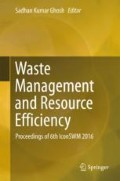Abstract
Most of the urban local bodies in the country are grappling with the problems of proper management of municipal solid waste. With limited finances at their disposal, they are unable to provide proper treatment and disposal to the waste collected in cities. As the solid waste streams in most cities contain around 50% of organic waste, waste-to-energy projects provide viable option for treating this waste. This paper examines the viability of two waste-to-energy options (biomethanation and RDF-based projects) which have been implemented with some degree of success in the country. The projects with capacities—3, 5 and 10 MW—were considered for biomethanation route, and single project with capacity 6.5 MW was considered for RDF-based option. The viability-gap analysis shows that there exists a funding gap of Rs. 0.24, Rs. 0.82 and Rs. 1.51 per kWh, respectively, for the three biomethanation options and gap of Rs. 2.35 per kWh for RDF-based option. The funding gap to some extent can be met by availing certified emission reductions (3 MW projects would not require any more funding) but would require more support in terms of subsidies for these projects to be financially viable in Indian context.
Access this chapter
Tax calculation will be finalised at checkout
Purchases are for personal use only
Notes
- 1.
The cost for collection and transportation of MSW from source of generation to the plant site also includes salary and wages of the staff involved.
References
CPCB (Central Pollution Control Board). (2005). Solid waste generation in Indian cities. Details available at www.cpcb.nic.in. Last accessed on December 30, 2008. Delhi: Central Pollution Control Board, Delhi.
CPCB 2013 CPCB. (2013). Status of municipal solid waste management. Delhi: Central Pollution Control Board.
Otoma, S., Mori, Y., Terazono, A., Aso, T., & Sameshima, R. (1997). Estimation of energy recovery and reduction of CO2 emissions in municipal solid power generation. Resources, Conservation and Recycling, 20, 95–117.
Pandey S, Sarawat N. (2009). Solid waste management. In D. Datt, S. Nischal (Eds.), Green India: Looking back to change tracks (pp. 177–194).TERI Press, New Delhi.
Petrov, M. P., Hunyadi, L. (2002). Municipal solid waste boiler and gas turbine hybrid combined cycles performance analysis. In: 1st International Conference on Sustainable Energy Technologies (SET 2002), paper no. EES6, Porto, Portugal.
Udomsri, S., Martin, A., & Fransson, T. (2006). Possibilities for municipal solid waste incineration and gas turbine hybrid dual-fueled cycles in Thailand. In 25th International Conference on Incineration and Thermal Treatment Technologies, Savannah, Georgia.
Acknowledgements
The authors wish to acknowledge the inputs received from various waste-to-energy project operators and convey their sincere thanks to funding of research by Asian Development Bank.
Author information
Authors and Affiliations
Corresponding author
Editor information
Editors and Affiliations
Rights and permissions
Copyright information
© 2019 Springer Nature Singapore Pte Ltd.
About this paper
Cite this paper
Pandey, S., Maurya, N., Garg, A. (2019). Viability-Gap Assessment for Municipal Solid Waste-Based Waste-to-Energy Options for India. In: Ghosh, S. (eds) Waste Management and Resource Efficiency. Springer, Singapore. https://doi.org/10.1007/978-981-10-7290-1_26
Download citation
DOI: https://doi.org/10.1007/978-981-10-7290-1_26
Published:
Publisher Name: Springer, Singapore
Print ISBN: 978-981-10-7289-5
Online ISBN: 978-981-10-7290-1
eBook Packages: Earth and Environmental ScienceEarth and Environmental Science (R0)

